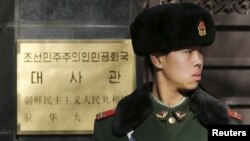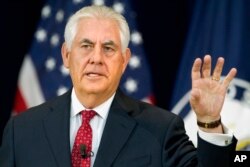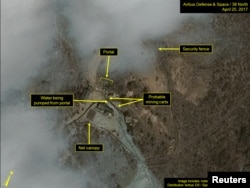U.S. Secretary of State Rex Tillerson has singled out China in the Trump administration's new approach to pressure North Korea to stop its provocative nuclear weapons program and missile tests.
Tillerson said there was an assumption that "China has limited influence on the regime in Pyongyang," or "they have a limited willingness to assert their influence" when President Donald Trump ordered a policy review on North Korea soon after taking office.
"The difference, I think, in our approach this time is we're going to test this assumption, so I told the president we've got to test that," Tillerson said Wednesday, in his second address to State Department employees.
"We're going to test it by leaning hard into them. And this is a good place to start our engagement with China," he added.
Washington is to host the first round of the U.S.-China Diplomatic and Security Dialogue in June, during which North Korea's nuclear and missile proliferation is high on the agenda.
The top U.S. diplomat said Washington is preparing additional sanctions if North Korea's actions warrant them.
New test preparations
On Wednesday, Airbus Defense & Space released satellite imagery of North Korea's Punggye-ri nuclear test facility. The new images indicate "an apparent resumption of activity" at the North Portal, the tunnel where North Korea appears to have been preparing for a nuclear test, according to 38 North, a Washington-based monitoring project.
In Pyongyang, North Korea's state media published a rare and strong criticism against China, saying commentaries from Chinese state media calling for tougher sanctions on Pyongyang's nuclear program are undermining bilateral relations.
Trump tweeted last week that North Korea disrespected the wishes of China when it launched an unsuccessful missile test on April 28.
Senior officials described threats from North Korea, which is trying to develop a long-range missile capable of hitting the U.S. mainland 9,000 kilometers away, as the number one U.S. national security priority.
B-1B flyovers
Earlier this week, two U.S. B-1B bombers were deployed over the Korean peninsula during a joint exercise with South Korea's air force.
North Korea criticized the U.S. bomber flights as a push to the brink of nuclear war.
In Beijing, the Chinese government urged all parties to stay calm and stop irritating each other.
A spokesperson from Chinese Ministry of Foreign Affairs called the situation "highly complex" and called for all sides to "work hard to create an atmosphere for contact and dialogue between all sides, and seek a return to the correct path of dialogue and negotiation as soon as possible."






